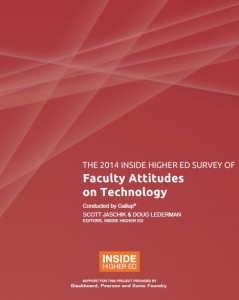In recent years, the publication Inside Higher Education has published a Survey on Faculty Attitudes Towards Technology, the most recent of which highlighted continuing skepticism over online learning in general.
The summary article linked above provides a good abstract of the Insider Higher Education survey results, and reading that (and the detailed results) over, there is nothing surprising about key findings which all reflect the fact that people on the ground delivering education to students are a lot less zealous over online teaching (or other technologies that create distance between themselves and those they teach) than are those of us who build and champion those technologies.
Given that I have spent more time taking than creating online courses (both traditional/paid online classes and MOOCs), I throw my lot in with the bulk of professors who feel that students will get more out of being in the classroom than watching the same material delivered over a screen. In fact, having worked in companies where people routinely spent more time talking to their colleagues over phone and Skype than face-to-face, I’d go further and say that technology is a hurdle to be overcome the more the activity being automated requires deep human connections.
Having said that, broad surveys like the one published by IHE tend to conflate the many trends that fall into the box labeled “online learning,” which makes it difficult to draw conclusions from the data they present.
To take the most obvious example, “learning” can consist of students who are unprepared for college taking remedial classes that require high levels of student support (or, if you keep going back into K-12, the millions of students who struggle in today’s public school system). But it can also consist of highly-motivated college students, or post-graduate lifelong learners, who are ready to sacrifice high-touch for convenience.
To cite an extreme example, my desire to study philosophy at the undergraduate level last year was genuine, but I was more than ready to sacrifice the benefits of doing so inside an institution (where I would have personal contact with professors and fellow students) in exchange for an education that was free and available on my own schedule.
For the first group (struggling students) online has proven a poor substitute for high-touch (just ask Sebastian Thrun). But for motivated, self-directed learners, any educational modality (classroom, small online, large-scale MOOC) can do the job of delivering learning.
Which brings up the question not mentioned in the survey (but one brought up in the comments section of the original IHE story) of how much teachers can or should be given responsibility for student success vs. making it the responsibility students to learn?
This is no idle question, given that most of the critique of education (primary, secondary and post-secondary) is directed at institutions where classroom is the norm. In other words, criticizing online for its very real shortcomings is all well and good, but if the thing that online learning is being negatively compared to is also not working (or not working well), then it’s fair to ask what can be done to fix a broken traditional paradigm (other than spending more money on it).
Finally, while the story wasn’t really about MOOCs, I would like to add that of all the online courses I’ve ever taken (which, to be fair, does not include that many traditional paid online classes), my MOOC experience was the only one where educators and developers were trying to innovate in ways that overcame the shortcomings of the medium (vs. just throwing existing classroom content onto an LMS and hoping for the best).
In other words, even if MOOCs aren’t destined to shake the academy to its foundations (whatever the hell that’s supposed to mean), if all they do is demonstrate to those creating online courses how their product can be better, more effective, more imaginative, more interactive and more educationally valuable, they will have done an incalculable service to students (however that term is defined).

Leave a Reply